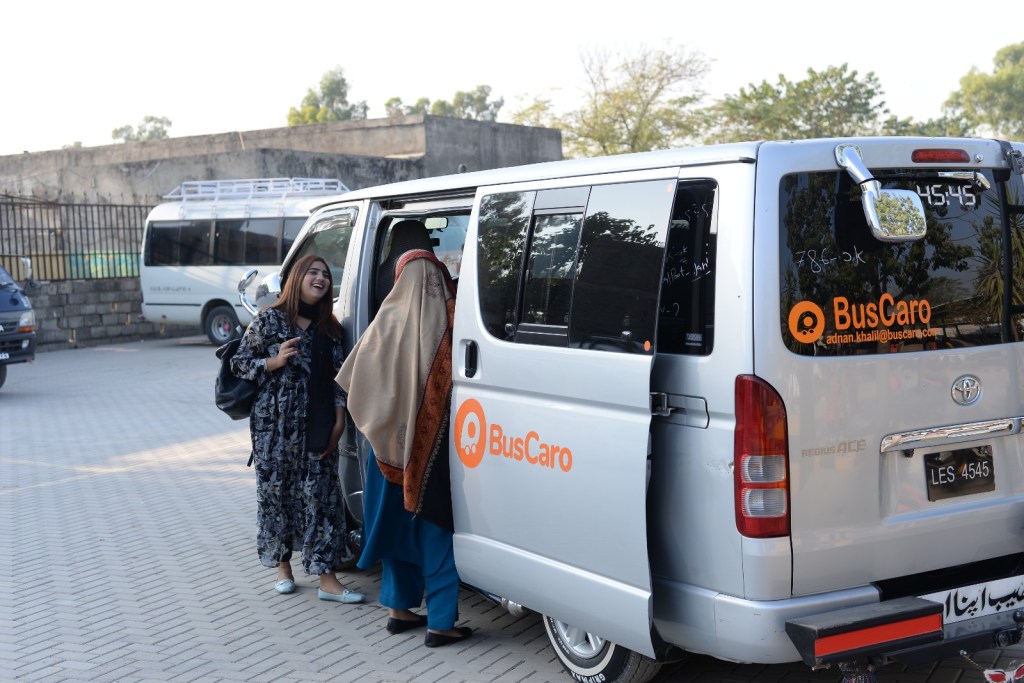When Maha Shahzad was 19, she was forced to drop out of junior college in Southern California because of a six-hour daily commute. When she moved to Pakistan for work, half of her salary was spent on commuting because she couldn’t find safe and reliable public transportation, a problem she says is faced by many Pakistanis. Shahzad explained to TechCrunch that 85% of working women in the country have faced sexual harassment at least once on public transport.
“The dire state of affairs when it comes to commuting is a very real problem facing Pakistanis across the country, especially women,” she said. Shahzad founded BusCaro to give commuters a safe and reliable alternative for their daily commutes.
The startup announced today it has raised $1.5 million in pre-seed funding led by Orbit Startups, SOSV’s program for startups in emerging markets. The round also included participation from Wahed Ventures and angel investors from the mobility sectors.
BusCaro lets commuters book rides through an app, but unlike other ridesharing apps, it uses a B2B2C model. For example, universities work with BusCaro to offer students reliable rides, while factories use it to give workers transportation. This also enables BusCaro to match demand with supply and increase operator incomes while keeping costs down for commuters.
It ensures rider safety with features like driver background checks, vehicle inspections and tracking. BusCaro also has an emergency response team and a 24/7 customer support team, and a live-tracking feature that lets riders share their locations with friends and family. Another feature, created specifically for women, lets them use a masked name instead of their real name to show to their drivers. The startup is currently working on building a panic/SOS button in the app that will connect passengers directly with BusCaro and its safety partner, security agency Mohafiz.
Since its launch in 2022, BusCaro has expanded operations into Karachi, Lahore and Islamabad and now has more than 300 vehicles, owned by private operators, and does over 20,000 bookings per day. The startup says it is on track to become profitable by early 2024 and recently hit $2.5 million in revenue.
Before founding BusCaro, Shahzad worked at ride-hailing app Careem, which was acquired by Uber in 2020. Despite Careem’s success, Shahzad realized that it could only be afforded by 2% to 3% of commuters. Then she joined Swvl, another mobility startup, which offered many transportation options besides cars. But as macro-economic conditions worsened last year, Swvl decided to exit Pakistan. As the general manager of Swvl Pakistan, Shazhad says she was at a crossroads.

“I knew that despite the model’s extreme unit economics, Swvl was solving a huge problem and we needed to continue solving that problem,” she says. “That’s when we put our first BusCaro bus on the road and got started on this journey.”
She adds that BusCaro’s model is different from the investment-heavy, high customer-acquisition cost model used by other ridesharing apps. By partnering with corporate and academic organizations, BusCaro is able to get access to a user base of employees and students on a B2B model or seat-based B2B2C model. Shahzad says its business model has reduced BusCaro’s customer acquisition cost to almost zero.
BusCaro’s goal is to provide safe and affordable daily commute options for everyone. Shahzad says there isn’t enough public transportation to reach demand, and it’s often not safe, especially for women. Private mass-transit players that can leverage tech to scale efficiently are currently non-existent in the country, and ride-hailing options are unaffordable for many people.
She adds that BusCaro’s advantages include aggregating demand, while stabilizing and optimizing for supply payout, which helps transporters’ cash flows. It is also able to offer customers competitive prices because it uses buses and minivans, which result in lower costs per fixed seat and saves on fuel.
Many commuters in Pakistan spend about 20% to 50% of their income on commute and transport, with women spending more as they look for safer options. BusCaro’s target customers are people who earn less or who can’t afford to spend that much of their monthly income on transportation.
Another audience for BusCaro is office workers who are tired of driving their own vehicles to work because of rising fuel prices and lack of parking spaces. Other users include students, especially girls, whose parents want them to use a safe commuting option.
“With BusCaro, they feel safe because of the measures we have in place, including back-checking our captains, vehicle inspections and track your ride feature in our application, which enables both the user and anyone they wish to share it with to track the ride,” says Shahzad.

BusCaro competes against several categories of ride-hailing platforms and public transportation. Shahzad says Careem is expensive even for its existing user base, but BusCaro is a third of the cost. There are other ride-hailing companies in Pakistan like In-Driver which are slightly cheaper and more reliable, but they don’t have security measures, which BusCaro does.
BusCaro is also up against public transport, but Shahzad describes that as “insufficient” and “extremely unsafe.” She adds that most riders use it because of affordability constraints and they would be willing to find other alternatives if any were available to them. Other public transport options include government-funded buses in Karachi, but Shazhad says there are not enough vehicles to fill demand, and most cover limited routes.
Finally, BusCaro is up against private players, but they don’t have the same tools as BusCaro to aggregate demand and optimize supply payouts.
Shahzad said BusCaro is currently “laser focused on growing our current business with adding more accounts to our portfolio now.” It plans to expand its B2B2C partnerships and add more B2C partnerships. BusCaro also plans to work with the public sector on things like transportation subsidies, carbon emissions reduction, SaaS and government transportation contracts. BusCaro is currently looking at adding electronic vehicles for the next year, to lower its costs as fuel prices increase.
In a statement about the investment, Orbit Startups managing general partner William Bao Bean said, “Diversity and inclusion is tough to achieve when women have to spend north of 30% of their salary on getting to work in a safe and predictable way. We backed BusCaro because they enable women and men to book safe, inexpensive and efficient shared transport to and from work, driving opportunities and opening up the overall economy.”































Comment